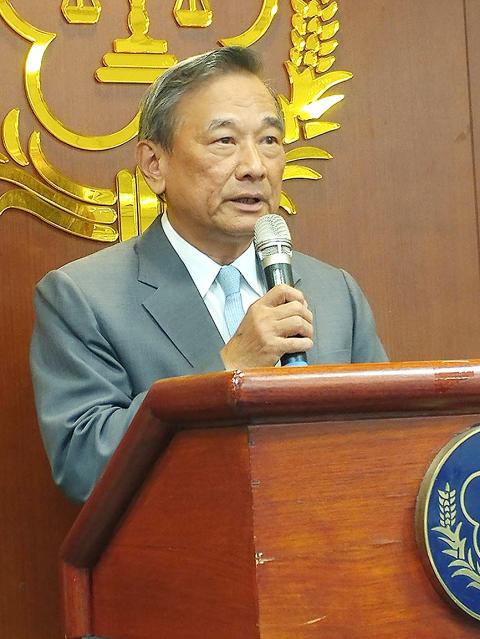Convicted murderer Lee Hung-chi (李宏基), who killed his ex-wife and their six-year-old daughter, was yesterday afternoon executed by shooting in Kaohsiung.
It was the first execution sanctioned by Minister of Justice Tsai Ching-hsiang (蔡清祥) — 46 days since he took office on July 16 — and the first under the administration of President Tsai Ing-wen (蔡英文) since she assumed the presidency on May 20, 2016.
Officials said 39-year-old Lee was informed of the Ministry of Justice’s approval to carry out the order earlier in the day before he was taken to the execution ground at Kaohsiung Second Prison, where he was shot in the heart from behind at 3:37pm.

Photo: CNA
In addition to the executioner, the process was watched by prosecutors, a coroner, the prison warden and security guards, Deputy Minister of Justice Chen Ming-tang (陳明堂) said in Taipei.
“Afterward, the body was examined and the coroner made the official announcement certifying Lee’s death at 4:01pm,” Chen said.
Lee and his ex-wife, surnamed Chen (陳), had two daughters. She had filed for a restraining order following domestic violence incidents and later filed for divorce, gaining custody of their two daughters.
On April 16, 2014, Lee waited for his ex-wife at the kindergarten their daughters attended, where he stabbed her to death with a kitchen knife before taking his eldest daughter and driving to the mountains in Hsinchu County.
Lee fed his daughter sleeping pills and then tried to commit suicide by burning charcoal in the car.
They were found unconscious the next day and rushed to a local hospital. Despite the efforts of medical personnel, his daughter died one month later.
Judges rejected an appeal and handed Lee the death sentence, citing his lack of remorse and his vowing in court to complete “unfinished business” and to take revenge on his ex-wife’s family if he were to get out of prison.
Tsai said the ministry assessed the case with the highest prudence and applied the strictest criteria in reviewing and approving the execution warrant.
According to prison officials, when asked for his last words, Lee at first said he did not have any, but later said he felt sorry for his family.
Lee seemed ready to accept his fate and did not eat much of his last meal before requesting to smoke one last cigarette, prison officials said, adding that he walked to the execution ground without the assistance of security personnel.
Members of the Taiwan Alliance to End the Death Penalty held a protest following news of Lee’s execution, saying that it was a step backward for human rights in Taiwan.
Other human rights advocates asked if the government was trying to show the public that it was carrying out justice in the run-up to the Nov. 24 nine-in-one elections, saying that no nation should use the death penalty to score political points.
Carrying out executions would not solve society’s problems, they added.
Additional reporting by Chang Wen-chuan

INVESTIGATION: The case is the latest instance of a DPP figure being implicated in an espionage network accused of allegedly leaking information to Chinese intelligence Democratic Progressive Party (DPP) member Ho Jen-chieh (何仁傑) was detained and held incommunicado yesterday on suspicion of spying for China during his tenure as assistant to then-minister of foreign affairs Joseph Wu (吳釗燮). The Taipei District Prosecutors’ Office said Ho was implicated during its investigation into alleged spying activities by former Presidential Office consultant Wu Shang-yu (吳尚雨). Prosecutors said there is reason to believe Ho breached the National Security Act (國家安全法) by leaking classified Ministry of Foreign Affairs information to Chinese intelligence. Following interrogation, prosecutors petitioned the Taipei District Court to detain Ho, citing concerns over potential collusion or tampering of evidence. The

‘FORM OF PROTEST’: The German Institute Taipei said it was ‘shocked’ to see Nazi symbolism used in connection with political aims as it condemned the incident Sung Chien-liang (宋建樑), who led efforts to recall Democratic Progressive Party (DPP) Legislator Lee Kun-cheng (李坤城), was released on bail of NT$80,000 yesterday amid an outcry over a Nazi armband he wore to questioning the night before. Sung arrived at the New Taipei City District Prosecutors’ Office for questioning in a recall petition forgery case on Tuesday night wearing a red armband bearing a swastika, carrying a copy of Adolf Hitler’s Mein Kampf and giving a Nazi salute. Sung left the building at 1:15am without the armband and apparently covering the book with a coat. This is a serious international scandal and Chinese

Seventy percent of middle and elementary schools now conduct English classes entirely in English, the Ministry of Education said, as it encourages schools nationwide to adopt this practice Minister of Education (MOE) Cheng Ying-yao (鄭英耀) is scheduled to present a report on the government’s bilingual education policy to the Legislative Yuan’s Education and Culture Committee today. The report would outline strategies aimed at expanding access to education, reducing regional disparities and improving talent cultivation. Implementation of bilingual education policies has varied across local governments, occasionally drawing public criticism. For example, some schools have required teachers of non-English subjects to pass English proficiency

TRADE: The premier pledged safeguards on ‘Made in Taiwan’ labeling, anti-dumping measures and stricter export controls to strengthen its position in trade talks Products labeled “made in Taiwan” must be genuinely made in Taiwan, Premier Cho Jung-tai (卓榮泰) said yesterday, vowing to enforce strict safeguards against “origin laundering” and initiate anti-dumping investigations to prevent China dumping its products in Taiwan. Cho made the remarks in a discussion session with representatives from industries in Kaohsiung. In response to the US government’s recent announcement of “reciprocal” tariffs on its trading partners, President William Lai (賴清德) and Cho last week began a series of consultations with industry leaders nationwide to gather feedback and address concerns. Taiwanese and US officials held a videoconference on Friday evening to discuss the